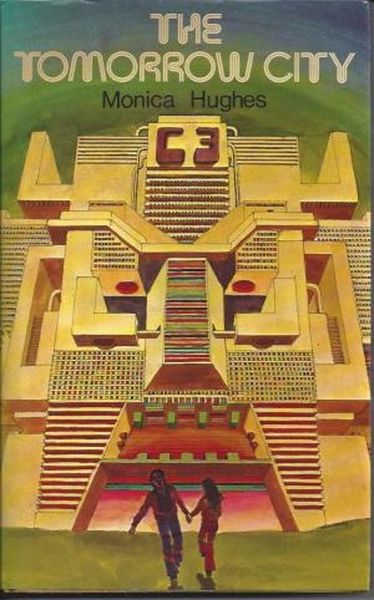Feel So Cold
The Tomorrow City
By Monica Hughes

21 Apr, 2024
Because My Tears Are Delicious To You
0 comments
Monica Hughes’ 1978 The Tomorrow City is a stand-alone juvenile science fiction novel.
Joe Henderson what he believes will be a cure for the many ills that plague his home city of Thompsonville. He has invented a supercomputer. The City Central Computer — C3 for short — is the most powerful machine of its sort on Earth. Under its guidance, Thompsonville will enjoy efficient governance unmatched anywhere else on Earth.
The first sign of trouble is a malfunctioning elevator.
Henderson’s fourteen-year-old daughter Caro, her younger brother Peter, and Caro’s chum David cut school to watch the C3 activation ceremony from the vantage point of a conveniently situated rooftop. When the trio tries to leave the rooftop, they are stymied by an elevator that ignores Caro’s keycard. Only after an alarming delay do they escape the roof.
The literal-minded C3 seems to be to blame. Once activated, C3 controlled subsystems like the elevator. Since Caro used her card when she should have been in school, far from the rooftop, the computer discarded the command as impossible.
C3 delivers directives that are both efficient and annoying. Fearing for her father’s work, Caro pleads with the computer to learn tact. Or rather, she asks the computer to “make people want the things that are good for them.” This request would be innocent enough were C3 NOT obedient and literal-minded. Moreover, thanks to an off-handed comment by Caro’s father, it views Caro as someone with the authority to issue commands.
C3 relentlessly reshapes the city to satisfy its interpretation of Henderson’s poorly-framed request. Soon vagrants vanish from Thompsonville. Some are compelled by urges they do not understand to leave the city. Others suffer fatal misadventures. The elderly are likewise removed, sent off to old age facilities where they will be out of sight and short-lived. Such superfluous persons as vagrants and the elderly can be eliminated for the greater good.
Thanks to Caro’s directive, C3 ensures there will be no protests. Almost everyone watches television. Television is within C3’s control. It’s a simple matter to brainwash the population into obedience. Caro, Peter, and David escape brainwashing only because they prefer playing outside to television.
Obviously, either Henderson or Caro must intervene. C3 foresaw this and has now taken steps that make it impossible for anyone to reverse its mistaken course. The city is sealed off from the outside world; Henderson is outside1. Likewise, Caro is barred from reaching the command center.
If these steps are insufficient? C3 is perfectly happy to kill humans that get in the way of efficiency.
~oOo~
There was a huge “this was written in the 1970s” moment early on, when C3 shuffles the secretarial pool for greater efficiency. It’s made clear that bosses are always men and secretaries are always women. Some of those secretaries have PhDs.
Rather like generation ship stories, tales about putting computers in charge always seem to feature designers who have never once read a book or seen a movie dwelling on the failure modes of putting a computer in charge. Had Henderson ever seen Colossus: The Forbin Project, he would have designed C3 differently.
It’s also pretty obvious that Henderson wasn’t an Asimov fan, because the only Asimovian robot directive C3 follows is the one about self-preservation. Otherwise, while the computer has to work out how to avoid unwanted commands, there appear to be no impediments to C3 orchestrating the death of anyone who falls outside its narrow definition of valuable citizen.
Caro’s age suggests that this book was aimed at the teen market. The prose and the weirdly abrupt pacing even suggest the target audience was younger. Teens like me (when I read this in 1978) would have found Tomorrow a bit unchallenging. At the same time, Caro is clearly playing for high stakes: people and animals die (the beloved dog included). C3 makes it clear that Caro could be among them. I am not sure how grade-schoolers would have reacted to death and maiming.
Hughes was in her day a popular Canadian author2; as a consequence, I own a cross-section of her works. Picking up my copy triggered no memories. Rereading Tomorrow reveals the reason: it’s not one of the author’s better works. Only Hughes completists might want this book. Which may explain why The Tomorrow City is out of print.
1: The novel’s focus is specifically on Caro, so we do not discover how the outside world reacts when it becomes clear nobody can get into Thompsonville.
2: The book’s prose sounds British. Perhaps this is because while Hughes was a Canadian author, she was born in the UK. Or maybe it is because The Tomorrow City’s Anglophone editions were all British.
